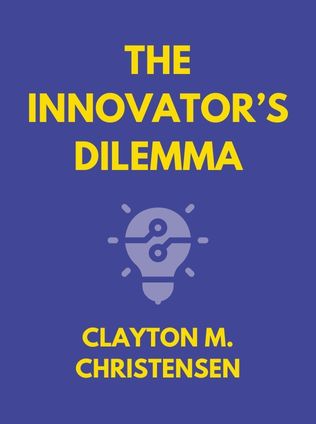
The Innovator’s Dilemma
When New Technologies Cause Great Firms to Fail
By Clayton M. Christensen
Published 01/2016
About the Author
Clayton M. Christensen is a renowned business strategist and the Kim B. Clark Professor of Business Administration at the Harvard Business School. Known for his groundbreaking work on innovation and disruptive technologies, Christensen has authored several influential books, including the widely acclaimed "The Innovator’s Dilemma," "The Innovator’s Solution," and "How Will You Measure Your Life?" He is also the co-founder of Innosight, a growth-strategy consultancy; Rose Park Advisors, an investment firm; and the Christensen Institute, a non-profit think tank. His contributions to the field of business management have earned him the title of the world’s most influential business thinker by Thinkers50 in both 2011 and 2013.
Main Idea
"The Innovator’s Dilemma" explores the paradox that successful companies often fail precisely because they do everything right. Christensen delves into the reasons why established firms struggle to adapt to disruptive innovations, despite their resources and expertise. The core argument of the book is that the principles of good management, such as listening to customers and focusing on high-return investments, can lead to failure when dealing with disruptive technologies. Through comprehensive theories and real-world examples, Christensen provides managers with tools to recognize and navigate these challenges, ensuring their companies can thrive in the face of technological change.
Table of Contents
- Introduction: The Innovator’s Dilemma
- The Importance of Abandoning Traditional Business Practices
- Following Your Customers to Failure
- How Great Companies Fail
- The Risky Business of Emerging Markets
- Appraising an Organization’s Capabilities
Introduction: The Innovator’s Dilemma
Clayton Christensen begins by addressing two pivotal questions that fueled his research: "Why is success so difficult to sustain?" and "Is successful innovation really as unpredictable as the data suggests?" These questions led him to explore the nature of innovation and its impact on established businesses. Christensen identifies the "innovator’s dilemma" as the paradox where doing the right thing according to traditional management practices can lead to a company’s downfall when faced with disruptive technologies.
The Importance of Abandoning Traditional Business Practices
Christensen emphasizes that traditional business practices, such as always listening to the best customers and focusing on high-return investments, can be detrimental in the context of disruptive innovation. These practices, while effective for sustaining innovations, often cause companies to miss out on or mishandle disruptive opportunities. "Doing the right thing is the wrong thing," Christensen asserts, highlighting the need for companies to rethink their approach to innovation.
"Theories are statements of cause and effect that help us understand what actions yield which results, and why. A good theory is consummately practical." – Clayton Christensen
In the realm of business, adhering to conventional wisdom can sometimes blind companies to emerging opportunities. Christensen argues that by overly focusing on the needs of existing customers, companies can neglect the nascent demands of new markets. This oversight is often where disruptive innovations take root. He stresses the importance of being attuned not just to current customer demands but also to the potential for future market shifts that can redefine industry standards.
Sign up for FREE and get access to 1,400+ books summaries.
You May Also Like
Rich Dad Poor Dad
What the Rich Teach Their Kids About Money - That the Poor and Middle Class Do Not!
By Robert T. KiyosakiFreakonomics
A Rogue Economist Explores the Hidden Side of Everything
By Steven D. Levitt and Stephen J. DubnerThe Lean Startup
How Today's Entrepreneurs Use Continuous Innovation to Create Radically Successful Businesses
By Eric RiesWho Moved My Cheese?
An Amazing Way to Deal with Change in Your Work and in Your Life
By Spencer Johnson, M.D.Factfulness
Ten Reasons We're Wrong About the World – and Why Things Are Better Than You Think
By Hans RoslingMake Your Bed
Little Things That Can Change Your Life...And Maybe the World
By William H. McRaven



















